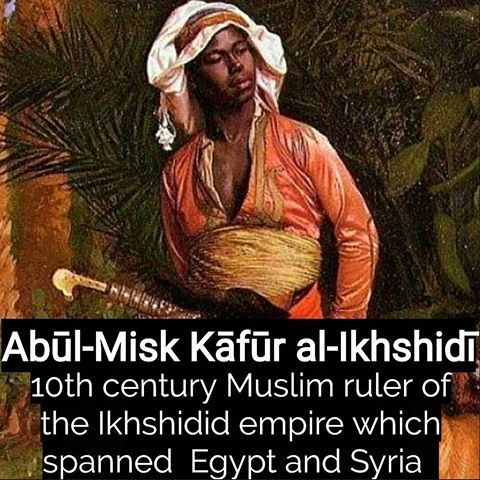|
Information suggests that Abu al-Misk Kafur was born in Ethiopia around 905 AD. He is described as a dark skinned boy who was very intelligent and was also a eunuch. He was brought as a slave in 923 AD by Mohammad ibn Tughj al-Ikshid the founder of the Ikhshidid dynasty of Egypt. Kafur was said to be loyal and always completed his duties with vigor. Because of his positive attributes Kafur was given the title of the supervisor of princely education, this made him the primary educator of the children of Mohammad ibn Tughj. Kafur excelled in his role as an educator and was rewarded with a second promotion to a military officer. As an officer Kafur participated in and lead military expeditions to Syria and the Hejaz, a region on the Western boarder of Saudi Arabia known as the “Western Provence.” His intelligence would often be on display during diplomatic negotiations between the Ikhsidid ruled Egypt and the caliph of Baghdad. Kafur became a high ranking political advisor to Mohammad ibn Tughj before becoming the ruler of Egypt after the death of Mohammad ibn Tughj in 946 AD. Even though ibn Tughj had son’s Kafur was placed in charge of the boys, therefore he held seniority over them as it pertains to ascending to the throne of Egypt. Kafur’s rise to the throne was viewed as a rags to riches story, he was viewed as a capable and steady ruler by his peers. At this time in Islamic history it was rare for an African slave to rise to the position of a ruler. It was common for African slaves to become a part of the military or even military leaders, but Kafur was one of the first to help break the mold. He ruled Egypt under the name of the Ikhshidid until 966 AD after the death of ibn Tughj’s youngest son Ali. Kafur defended his crown against the Ghalbūn rebellion from 947 to 948. He survived a coup d’état and negative propaganda from his enemies. Kafur’s army and mystique was powerful enough to suppress the Fatmid expansion into Egypt. He maintained economic stability along with displaying his love for the arts. The poet al-Mutanabbi praised Kafur in his writings, until Kafur refused to reward the poet with a high ranking office; ai-Mutanabbi then used his poetry to discredit the ruler of Egypt. Kafur is one of our lesser known figures in history, his influence in the Islamic world is barley spoken of in the world history classrooms across the United States. Kafur, like many other African heroes have helped to change the world, but their stories are almost lost within the pages of history. He was able to become the de facto ruler of Egypt despite being made a eunuch and enslaved as a child. The Ikhshidid were invaders ruling Egypt but his ascension returned an African born ruler the throne. Abu al-Misk Kafur, we proudly stand on your shoulders. J.A. Ward. References:
https://en.wikipedia.org/wiki/Hejaz http://www.metmuseum.org/toah/ht/06/afe.html http://www.mereja.com/forum/viewtopic.php?f=2&t=66318&mobile=on
0 Comments
Leave a Reply. |
Details
Categories
All
Click Here to join our mailing list
|
Contact Us: |
Connect With Us |
Site powered by PIT Web Design


 RSS Feed
RSS Feed



